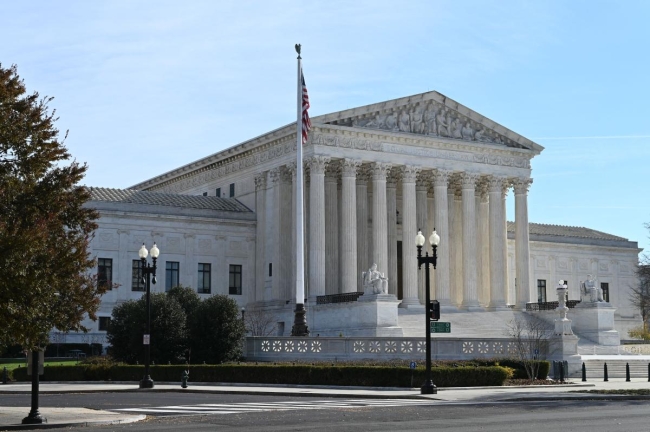You have /5 articles left.
Sign up for a free account or log in.

DANIEL SLIM/AFP via Getty Images
Another lawsuit challenging the Biden administration’s student loan forgiveness plan is heading to the U.S. Supreme Court.
Justice Samuel Alito, who hears emergency applications in the Fifth Circuit, granted the Biden administration’s petition before judgment in a lawsuit brought by Myra Brown and Alexander Taylor, two individuals with federal student loan debt who challenged the debt-relief plan because they wouldn’t benefit from all the provisions and didn’t have the chance to comment on the proposal. The court then granted the petition to hear the case.
Individuals earning less $125,000 could see $10,000 forgiven under the Biden administration’s plan, while those who received a Pell Grant while in college would get an extra $10,000 in debt relief. Brown’s federal student loans aren’t eligible for relief, and while Taylor, who didn’t receive a Pell Grant, would $10,000 in relief.
“Respondents agree with the department that the court should grant certiorari before judgment,” Brown and Taylor’s Supreme Court brief states. “This case presents issues of ‘imperative public importance’ that warrant this court’s immediate review. The department seeks to immediately forgive the debts of tens of millions of individuals at a cost of nearly half a trillion dollars, and it seeks to do so without going through the proper rulemaking process. This court should decide whether these extraordinary actions are lawful.”
The Job Creators Network Foundation, which is run by Republican donor Bernie Marcus, is funding Brown and Taylor’s lawsuit, which was filed Oct. 10 and quickly made its way through the federal court system.
A U.S. district judge in Texas ruled in favor of Brown and Taylor on Nov. 10 and vacated the program. The Biden administration then appealed to the U.S. Court of Appeals for the Fifth Circuit, but a three-judge panel declined to overrule the district judge.
Alito deferred ruling on the administration’s request for a stay, so the nationwide injunction blocking the student loan forgiveness plan remains in place. Oral arguments will be scheduled for February 2023, likely on the same day as arguments in the other debt-relief lawsuit, Biden v. Nebraska. In that case, the attorneys general of six states sued to block student loan forgiveness, arguing the plan would harm state revenues as well as state agencies that hold federal student loans, such as the Missouri Higher Education Loan Authority.
At issue in both cases now before the court is whether the plaintiffs have standing to bring their claims and if Education Secretary Miguel Cardona has the authority to cancel debts under the Higher Education Relief Opportunities for Students, or HEROES, Act of 2003. The act was passed after the Sept. 11 attacks and authorizes the education secretary to forgive student loans during specific periods such as a war or national emergency. The White House has said that the COVID-19 pandemic qualifies as such a national emergency, while opponents of the plan disagree.
The Job Creators Network Foundation is “pleased that the Supreme Court has decided to hear our case,” foundation president Elaine Parker said in a statement. “The Biden Administration has no emergency authority under the HEROES Act to cancel hundreds of billions of dollars in student loan debts. Congress should instead address the root of the student loan problem: unaccountable colleges that rapidly raise tuition while sitting on $700 billion in endowments. If this illegal program isn’t stopped, it will give the executive branch a blank check, not only for this president, but every future president without any input from Congress or any public participation.”
Persis Yu, deputy executive director and managing counsel at the Student Borrower Protection Center, said putting the two lawsuits together could highlight “how absurd these lawsuits are.”
“It just lays bare how much the courts are being used to subvert the political process,” she said.
She said her center is working with other groups to file briefs and is focused on including the voices of borrowers who would be affected by student loan forgiveness.
“They’re being treated like political pawns,” she said of the borrowers.
The administration has faced at least six lawsuits so far since announcing in August that it planned to forgive up to $20,000 in federal student loans for eligible Americans. More than 26 million people applied for debt relief before the program was vacated.
Brown, who took out more than $17,000 in federal student loans to pay for graduate school, isn’t eligible for relief because her loans are commercially held. The administration decided to not include commercially held federal student loans in part to undermine potential legal arguments. Meanwhile, Taylor, who has more than $35,000 in outstanding student loans that he used to pay for his undergraduate degree, would qualify only for $10,000 in relief.
“Respondents believe it is irrational, arbitrary, and unfair to exclude Brown from the program just because her debt is commercially held and not in default, and to calculate the amount of debt forgiveness Taylor receives based on the financial circumstances of his parents,” their lawyers wrote in a court filing arguing against a stay.




